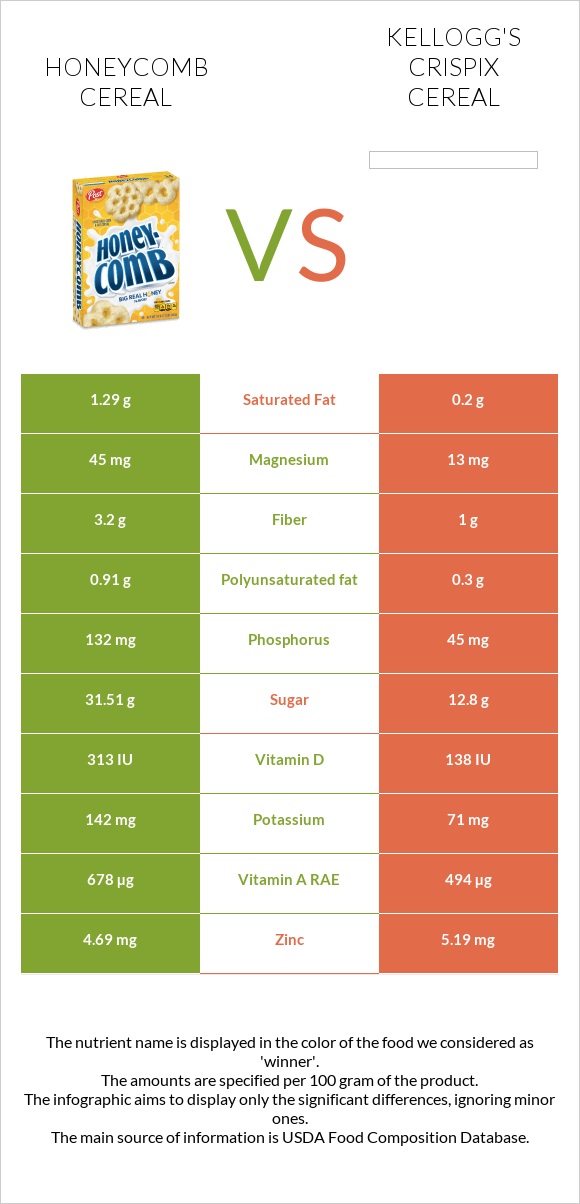Honeycomb Cereal vs. Kellogg's Crispix Cereal — In-Depth Nutrition Comparison
Compare
A recap on the differences between honeycomb Cereal and kellogg's Crispix Cereal
- Honeycomb Cereal is higher in vitamin D and phosphorus, yet kellogg's Crispix Cereal is higher in iron, folate, vitamin B6, vitamin B12, vitamin B2, vitamin B3, vitamin B1, and vitamin C.
- Kellogg's Crispix Cereal covers your daily iron needs 245% more than honeycomb Cereal.
- Honeycomb Cereal contains 3 times more phosphorus than kellogg's Crispix Cereal. While honeycomb Cereal contains 132mg of phosphorus, kellogg's Crispix Cereal contains only 45mg.
Food varieties used in this article are Cereals ready-to-eat, POST, Honeycomb Cereal and Cereals ready-to-eat, KELLOGG, KELLOGG'S CRISPIX.
Infographic

Infographic link
Mineral Comparison
Mineral comparison score is based on the number of minerals by which one or the other food is richer. The "coverage" charts below show how much of the daily needs can be covered by 300 grams of the food.
| Contains more MagnesiumMagnesium | +246.2% |
| Contains more CalciumCalcium | +22.2% |
| Contains more PotassiumPotassium | +100% |
| Contains more PhosphorusPhosphorus | +193.3% |
| Contains less SodiumSodium | -16.2% |
| Contains more IronIron | +231.8% |
| Contains more CopperCopper | +57.7% |
| Contains more ZincZinc | +10.7% |
| Contains more SeleniumSelenium | +19.2% |
Vitamin Comparison
Vitamin comparison score is based on the number of vitamins by which one or the other food is richer. The "coverage" charts below show how much of the daily needs can be covered by 300 grams of the food.
| Contains more Vitamin AVitamin A | +37.2% |
| Contains more Vitamin EVitamin E | +70% |
| Contains more Vitamin DVitamin D | +122.9% |
| Contains more Vitamin KVitamin K | +500% |
| Contains more Vitamin CVitamin C | +∞% |
| Contains more Vitamin B1Vitamin B1 | +53.8% |
| Contains more Vitamin B2Vitamin B2 | +53.4% |
| Contains more Vitamin B3Vitamin B3 | +54.3% |
| Contains more Vitamin B6Vitamin B6 | +54.5% |
| Contains more Vitamin B12Vitamin B12 | +32% |
| Contains more FolateFolate | +208.6% |
All nutrients comparison - raw data values
| Nutrient |  |
 |
DV% diff. |
| Iron | 8.44mg | 28mg | 245% |
| Folate | 313µg | 966µg | 163% |
| Vitamin B6 | 1.56mg | 2.41mg | 65% |
| Vitamin B12 | 4.69µg | 6.19µg | 63% |
| Vitamin B2 | 1.33mg | 2.04mg | 55% |
| Vitamin B1 | 1.17mg | 1.8mg | 53% |
| Vitamin B3 | 15.62mg | 24.1mg | 53% |
| Vitamin C | 0mg | 21mg | 23% |
| Vitamin D | 313 IU | 138 IU | 22% |
| Vitamin D | 7.8µg | 3.5µg | 22% |
| Vitamin A | 678µg | 494µg | 20% |
| Phosphorus | 132mg | 45mg | 12% |
| Fiber | 3.2g | 1g | 9% |
| Magnesium | 45mg | 13mg | 8% |
| Copper | 0.13mg | 0.205mg | 8% |
| Zinc | 4.69mg | 5.19mg | 5% |
| Sodium | 553mg | 660mg | 5% |
| Saturated fat | 1.29g | 0.2g | 5% |
| Selenium | 10.4µg | 12.4µg | 4% |
| Vitamin B5 | 0.219mg | 4% | |
| Polyunsaturated fat | 0.91g | 0.3g | 4% |
| Fats | 2.93g | 0.8g | 3% |
| Potassium | 142mg | 71mg | 2% |
| Calories | 394kcal | 378kcal | 1% |
| Protein | 6.01g | 6.59g | 1% |
| Monounsaturated fat | 0.6g | 0.2g | 1% |
| Net carbs | 83.43g | 86.19g | N/A |
| Carbs | 86.63g | 87.19g | 0% |
| Calcium | 11mg | 9mg | 0% |
| Sugar | 31.51g | 12.8g | N/A |
| Vitamin E | 0.17mg | 0.1mg | 0% |
| Vitamin K | 0.6µg | 0.1µg | 0% |
| Trans fat | 0.01g | 0g | N/A |
| Choline | 8.6mg | 6mg | 0% |
Macronutrient Comparison
Macronutrient breakdown side-by-side comparison
Protein:
6.01 g
Fats:
2.93 g
Carbs:
86.63 g
Water:
1.5 g
Other:
2.93 g
Protein:
6.59 g
Fats:
0.8 g
Carbs:
87.19 g
Water:
3 g
Other:
2.42 g
| Contains more FatsFats | +266.3% |
| Contains more OtherOther | +21.1% |
| Contains more WaterWater | +100% |
~equal in
Protein
~6.59g
~equal in
Carbs
~87.19g
Fat Type Comparison
Fat type breakdown side-by-side comparison
Saturated fat:
Sat. Fat
1.29 g
Monounsaturated fat:
Mono. Fat
0.6 g
Polyunsaturated fat:
Poly. Fat
0.91 g
Saturated fat:
Sat. Fat
0.2 g
Monounsaturated fat:
Mono. Fat
0.2 g
Polyunsaturated fat:
Poly. Fat
0.3 g
| Contains more Mono. FatMonounsaturated fat | +200% |
| Contains more Poly. FatPolyunsaturated fat | +203.3% |
| Contains less Sat. FatSaturated fat | -84.5% |



